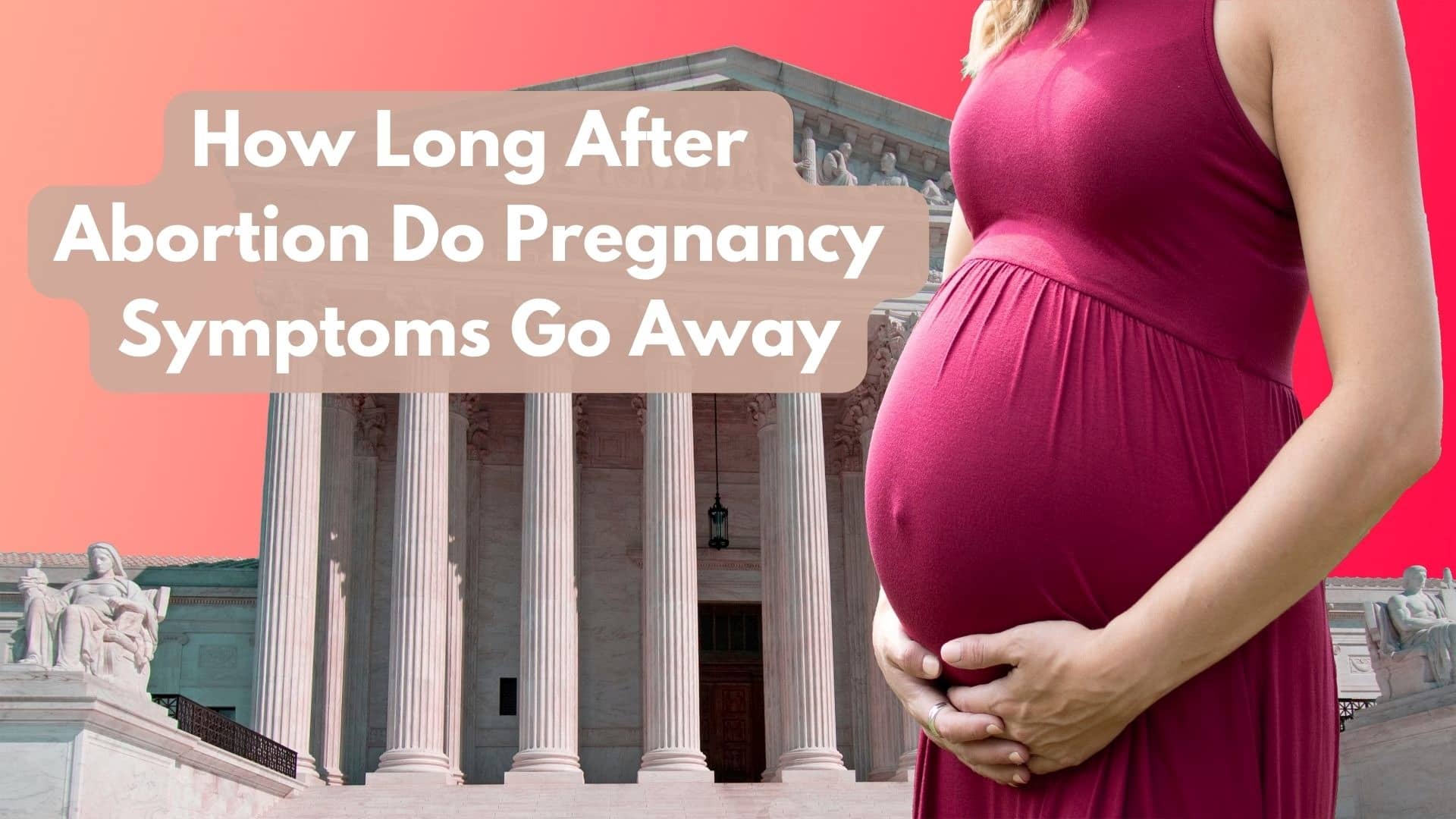In this article, we will discuss the timeline of pregnancy symptoms disappearing after an abortion. Whether you have recently undergone an abortion or are considering one, it is natural to wonder how long it will take for the pregnancy symptoms to subside.
Understanding the duration of these symptoms can help ease any concerns or uncertainties you may have. So, let’s explore the topic of how long it typically takes for pregnancy symptoms to go away following an abortion.
Common Pregnancy Symptoms After an Abortion
Nausea and Vomiting
Nausea and vomiting, also known as morning sickness, are common pregnancy symptoms that may persist after an abortion. These symptoms are caused by hormonal changes in the body and can vary in severity. To alleviate nausea and vomiting, it is advisable to eat small, frequent meals, avoid trigger foods or smells, drink plenty of fluids, and try relaxation techniques such as deep breathing or aromatherapy.
Breast Tenderness and Changes
After an abortion, breast tenderness and changes may continue due to lingering hormonal fluctuations. Breasts may feel sensitive, swollen, or even painful. Wearing a supportive bra, applying warm or cold compresses, and practicing gentle breast massage can help alleviate discomfort.
Fatigue and Drowsiness
Fatigue and drowsiness are common pregnancy symptoms that can persist after an abortion. The body is still recuperating from the physical and emotional aspects of the procedure, and hormonal changes can contribute to ongoing feelings of fatigue. Ensuring an adequate amount of rest, practicing good sleep hygiene, and engaging in light exercise can help combat fatigue and promote feelings of energy.
Frequent Urination
The need to urinate frequently is another pregnancy symptom that may persist after an abortion. Hormonal changes can increase blood flow to the pelvic area, leading to increased urine production. It is important to stay hydrated and avoid caffeine and other diuretics that can exacerbate this symptom.
Also Check: 10 Fun Christmas activities for toddlers?
Mood Swings and Emotional Changes
Emotional changes and mood swings are common during pregnancy and can continue after an abortion. Hormonal fluctuations, physical recovery, and the emotional impact of the procedure can all contribute to these changes. Engaging in regular exercise, practicing stress management techniques such as meditation or yoga, and seeking emotional support from loved ones or a therapist can help navigate these emotional changes.
Food Cravings and Aversions
Food cravings and aversions may persist after an abortion due to hormonal changes and ongoing fluctuations in the body. If food cravings or aversions are causing discomfort or interfering with a balanced diet, it is advisable to consult with a healthcare professional or a registered dietitian. They can provide guidance on maintaining a healthy and nutritious diet during this time.
Abdominal Pain and Cramping
Abdominal pain and cramping are common pregnancy symptoms that can continue after an abortion. The uterus is still contracting and returning to its pre-pregnancy size, and this can cause discomfort. Applying a heating pad or taking a warm bath, practicing relaxation techniques, and taking over-the-counter pain relievers as recommended by a healthcare professional can help alleviate abdominal pain and cramping.
Spotting and Bleeding
Spotting and light bleeding can occur after an abortion, and it is considered a normal part of the healing process. The duration and intensity of spotting and bleeding can vary. It is important to follow post-abortion instructions provided by the healthcare professional and to reach out if bleeding becomes excessively heavy or is accompanied by severe pain or fever.
Headaches
Headaches are a common complaint during pregnancy and can persist or occur after an abortion. Hormonal changes, stress, fatigue, and other factors can contribute to headaches. To alleviate headaches, it is advisable to rest in a dark, quiet room, practice relaxation techniques, apply a cold or warm compress to the forehead or neck, and drink plenty of fluids.
Dizziness and Faintness
Feeling dizzy or faint can be a pregnancy symptom that may persist after an abortion. Hormonal changes, fluctuations in blood pressure, and blood loss during the procedure can contribute to these sensations. It is important to avoid sudden movements, stay hydrated, eat regular meals, and rest when needed to prevent dizziness and faintness.

This image is property of images.pexels.com.
Factors Affecting Duration of Pregnancy Symptoms
Gestational Age of the Aborted Pregnancy
The gestational age of the aborted pregnancy can influence the duration of pregnancy symptoms. Generally, the earlier the pregnancy was terminated, the faster the body can recover and return to its pre-pregnancy state. However, every woman’s body is different, and the exact impact of gestational age on symptom duration can vary.
Method of Abortion
The method used to perform the abortion can also affect the duration of pregnancy symptoms. Surgical and medical abortion methods have different physiological impacts on the body, which can influence symptom duration. It is important to discuss the potential impact of the chosen method with a healthcare professional.
Individual Hormonal Variation
Each woman has a unique hormonal makeup, and this can influence how long pregnancy symptoms persist after an abortion. While some women may experience a rapid decline in symptoms, others might have a more gradual resolution. Understanding individual hormonal fluctuations can help manage expectations and seek appropriate medical guidance.
Psychological Factors
Psychological factors, such as the emotional aspects of the abortion, can impact the duration of pregnancy symptoms. Stress, anxiety, and feelings of loss or grief may exacerbate symptoms or contribute to their persistence. Seeking emotional support from loved ones, engaging in therapy or counseling, and practicing self-care can help manage these psychological factors.
Presence of Complications
If there were any complications during the abortion procedure, it can affect the duration of pregnancy symptoms. Complications may require additional medical interventions or a longer recovery period, which can extend the time it takes for symptoms to resolve. It is important to follow up with healthcare professionals if complications arise.
Underlying Medical Conditions
Underlying medical conditions, such as hormonal imbalances or certain reproductive disorders, can impact how long pregnancy symptoms last after an abortion. These conditions may require specific medical interventions or ongoing management, which can influence symptom resolution. It is essential to discuss underlying medical conditions with a healthcare professional.
Stress Levels
Stress levels can impact the body’s ability to recover and return to normal after an abortion. High levels of stress can disrupt hormonal balance and overall health, potentially prolonging symptom duration. Engaging in stress management techniques, such as exercise, meditation, or seeking therapy, can help reduce stress and aid in symptom relief.
Overall Health and Immune System Function
A woman’s overall health and immune system function can affect how long pregnancy symptoms last after an abortion. Good overall health can promote a faster recovery, while a compromised immune system or underlying health issues may prolong symptom duration. Maintaining a healthy lifestyle, eating a balanced diet, and following post-abortion instructions can support overall health and immune system function.
Medication or Supplements Taken
Certain medications or supplements taken after an abortion can impact symptom duration. Some medications may have side effects that mimic pregnancy symptoms, while others may actually alleviate symptoms. It is important to discuss any medications or supplements taken with a healthcare professional to determine their potential impact on symptom resolution.
Lifestyle Habits
Lifestyle habits, such as smoking, excessive alcohol consumption, or poor nutrition, can influence the duration of pregnancy symptoms after an abortion. Unhealthy habits can disrupt hormonal balance and overall health, potentially prolonging symptom resolution. Adopting a healthy lifestyle that includes regular exercise, a balanced diet, and avoiding harmful substances can support symptom relief.

This image is property of images.pexels.com.
Managing Lingering Pregnancy Symptoms
Following Post-Abortion Instructions
One of the most important steps in managing lingering pregnancy symptoms after an abortion is to follow the post-abortion instructions provided by the healthcare professional. These instructions are tailored to each individual case and can provide guidance on managing symptoms, monitoring recovery, and when to seek medical attention if needed.
Maintaining a Healthy Lifestyle
Maintaining a healthy lifestyle can contribute to the alleviation of pregnancy symptoms after an abortion. This includes eating a balanced diet, engaging in regular exercise, getting enough rest, staying hydrated, and avoiding harmful substances such as tobacco or excessive alcohol. A healthy lifestyle supports overall health and promotes a faster recovery.
Practicing Self-Care
Practicing self-care is essential in managing lingering pregnancy symptoms after an abortion. This can include engaging in activities that promote relaxation and well-being, such as taking baths, meditating, practicing deep breathing exercises, spending time outdoors, or pursuing hobbies and interests. Self-care helps reduce stress and supports emotional and physical healing.
Seeking Emotional Support
Emotional support plays a crucial role in managing pregnancy symptoms after an abortion. Sharing your feelings and concerns with trusted loved ones can provide comfort and reassurance. Additionally, seeking professional support through therapy or counseling can help navigate the emotional aspects of the abortion and promote overall well-being.
Consulting with Healthcare Professionals
If pregnancy symptoms persist or become increasingly severe, it is advisable to consult with healthcare professionals. They have the expertise to evaluate your symptoms, diagnose any underlying issues, and provide appropriate medical guidance. Timely medical intervention can prevent potential complications and ensure the best possible outcome.
Exploring Alternative Therapies
Some women find relief from pregnancy symptoms after an abortion through alternative therapies. These can include acupuncture, aromatherapy, herbal remedies, or massage. It is important to consult with a healthcare professional before exploring alternative therapies to ensure their safety and potential effectiveness in managing symptoms.
Taking Over-the-Counter Medications
In some cases, over-the-counter medications can help alleviate pregnancy symptoms after an abortion. Medications such as pain relievers, anti-nausea medications, or antacids can provide temporary relief from specific symptoms. However, it is crucial to consult with a healthcare professional to ensure the safety and appropriateness of any medications taken.
Frequently Asked Question (FAQs)
Q: What are pregnancy symptoms?
Pregnancy symptoms are physical and emotional changes that occur in a woman’s body when she is pregnant. These symptoms can vary from woman to woman, but some common signs include nausea and vomiting, breast tenderness, fatigue, frequent urination, mood swings, and food cravings.
Q: Why do pregnancy symptoms occur after an abortion?
After an abortion, the body goes through hormonal changes as it adjusts to the absence of pregnancy. These hormonal fluctuations can cause pregnancy symptoms to linger or reappear. Additionally, the body may still be producing pregnancy hormones for a period of time after the abortion, which can contribute to the persistence of symptoms.
Q: How long do pregnancy symptoms usually last after an abortion?
The duration of pregnancy symptoms after an abortion can vary from woman to woman. In general, most pregnancy symptoms gradually subside within a few weeks following the procedure. However, some women may experience lingering symptoms for a longer period of time. It is essential to consult with a healthcare professional to determine the specific duration of symptoms in each individual case.
Q: What are the common pregnancy symptoms that may linger after an abortion?
Common pregnancy symptoms that may persist or reoccur after an abortion include nausea and vomiting, breast tenderness and changes, fatigue and drowsiness, frequent urination, mood swings and emotional changes, food cravings and aversions, abdominal pain and cramping, spotting and bleeding, headaches, dizziness and faintness.
Q: Is it normal for pregnancy symptoms to come and go after an abortion?
Yes, it is normal for pregnancy symptoms to come and go after an abortion. The body is still adjusting to hormonal changes, and fluctuations in symptoms can occur. It is important to note, however, that if symptoms suddenly worsen or become severe, it is advisable to seek medical attention.
Q: What should I do if my pregnancy symptoms persist after an abortion?
If your pregnancy symptoms persist after an abortion, it is recommended to consult with a healthcare professional. They will be able to evaluate your symptoms and provide appropriate guidance and support. It is important not to ignore persistent symptoms, as they may be indicative of an underlying issue.
Q: Can pregnancy symptoms return after they have gone away following an abortion?
Yes, pregnancy symptoms can potentially return after they have initially gone away following an abortion. This can occur due to hormonal fluctuations or other factors influencing the body’s response to the abortion. If symptoms do reappear, it is advisable to seek medical advice to ensure that everything is progressing as expected.
Q: Are there any specific factors that can affect how long pregnancy symptoms last after an abortion?
Several factors can influence the duration of pregnancy symptoms after an abortion. These factors include the gestational age of the aborted pregnancy, the method of abortion, individual hormonal variation, psychological factors, presence of complications, underlying medical conditions, stress levels, overall health and immune system function, medication or supplements taken, and lifestyle habits.
Q: When should I be concerned about lingering pregnancy symptoms after an abortion?
While it is normal for pregnancy symptoms to linger to some degree after an abortion, there are certain situations in which it is advisable to seek medical attention. If symptoms become increasingly severe or are accompanied by additional concerning signs such as fever, excessive bleeding, or intense abdominal pain, it is important to consult with a healthcare professional promptly.
Q: Can I take any measures to alleviate pregnancy symptoms after an abortion?
Yes, there are measures you can take to alleviate pregnancy symptoms after an abortion. Following post-abortion instructions provided by your healthcare provider is crucial. Additionally, maintaining a healthy lifestyle, practicing self-care, seeking emotional support, consulting with healthcare professionals, exploring alternative therapies, and taking over-the-counter medications as recommended can contribute to easing symptoms and promoting overall well-being.
Conclusion
The duration of pregnancy symptoms after an abortion can vary from woman to woman. It is normal for symptoms to persist or reoccur due to hormonal fluctuations and the body’s recovery process. However, if symptoms become severe, worsen over time, or are accompanied by additional concerning signs, it is important to seek medical attention. Understanding the common pregnancy symptoms after an abortion and the factors that can affect their duration can help manage expectations and promote overall well-being.
By following post-abortion instructions, maintaining a healthy lifestyle, practicing self-care, seeking emotional support, consulting with healthcare professionals, exploring alternative therapies, and taking recommended over-the-counter medications, you can effectively manage lingering symptoms and facilitate your recovery journey. Remember, every woman’s experience is unique, so it is essential to prioritize self-care and seek guidance from healthcare professionals to ensure your specific needs are addressed.
